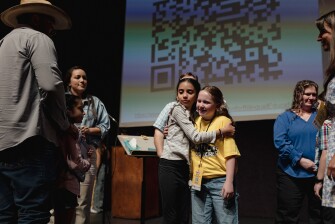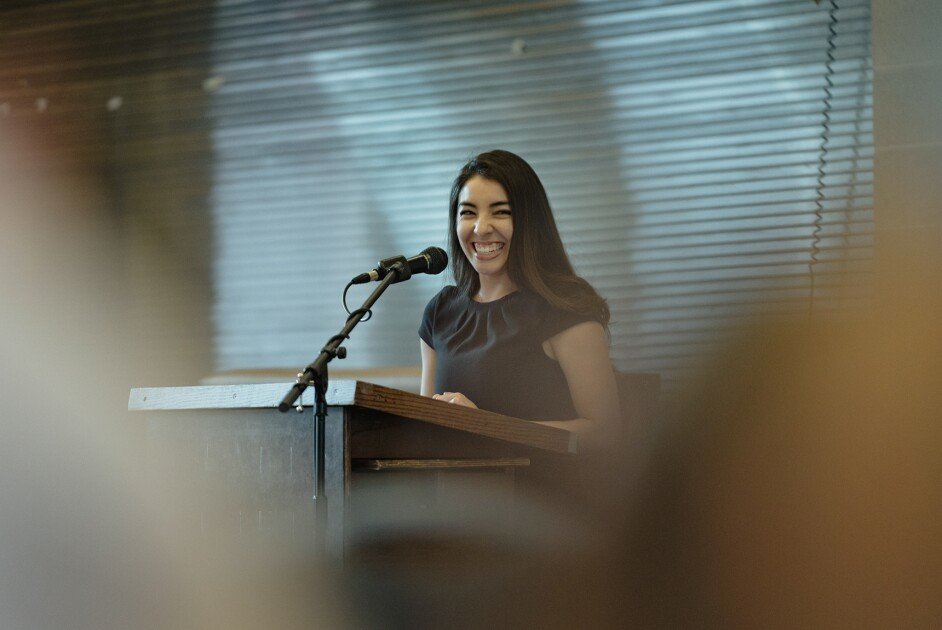Evelyn Juarez began competing in Spanish spelling bees in 3rd grade. By the time she was in 7th grade, she became the first-ever winner of the National Spanish Spelling Bee.
“It’s actually a funny story,” she told Education Week, recalling how she got started. Juarez placed third in her classroom competition at James H. Rodriguez Elementary School in Española, N.M., and entered the district-level competition as an alternate in 2006. Juarez ended up stepping in to compete by chance—a judge saw and told her she could compete despite being an alternate—and won.
This was her first of six consecutive district spelling bee victories. Then, in 2011, at the age of 13, she became the first winner of the National Spanish Spelling Bee, a now annual event where spellers compete entirely in Spanish.
“Winning that national spelling bee and all the district and state ones, they really did leave a pretty profound mark on me beyond memorizing words,” said Juarez. “The resilience, determination, and strong work ethic that I built during those competitions and preparing for those competitions carried over and shaped every part of my journey ever since.”
The history of Spanish spelling bees
Spanish spelling bees originated in New Mexico shortly after the state signed the Bilingual Multicultural Education Act in 1973, said Jose Reyes, a bilingual instructional specialist for the Gadsden Independent School District.
While Congress established the Bilingual Education Act of 1968, New Mexico was the first to mandate a statewide requirement of having bilingual programs and professional development for these specialized educators.
Reyes started his career as a 4th-grade teacher at Sunland Park Elementary School in 1982 in Sunland Park, N.M., and, along with colleagues, wondered why there weren’t Spanish spelling bees. That year, they hosted classroom competitions and eventually it became an annual occurrence.
By 1985, the Spanish spelling bee became a district-wide event with 12 schools in the Gadsden Independent School District participating, and in 1992, New Mexico became the first state to host a state Spanish Spelling bee.
Reyes got involved in organizing Spanish spelling bees in 1996 when he joined the district organizing committee. Then, in 2011, Reyes joined the organizing committee for the first national Spanish spelling contest, which was spearheaded by David Briseño.

This year, the competition took place on July 11 and July 12 in Albuquerque, N.M., and the winner was Melody Hinkle from Fort Worth, Texas.
The competition doesn’t have as many rules or qualifications as its counterpart, the Scripps National Spelling Bee, which has been in place for 100 years. The main criteria listed on the National Spanish Spelling Bee site is that students must be in grades 4 through 8 to compete, and they must have already placed in a state or regional Spanish spelling contest—which not all states offer. On average, there are between 30 to 35 participants coming from states like New Jersey, Georgia, Oregon, California, New Mexico, Texas, and more.
Over the years, a chunk of the winners of the Spanish spelling bee have come from Reyes’ New Mexico district, and as the district coordinator, he has taken the students to nationals.
“The greatest challenge, from my perspective, is trying to get interest from higher level—parents are always excited, but principals at the school need to know why we have this event,” said Reyes. “This is a celebration of language.”
Reyes, a native Spanish speaker, recalls his experience in school: “Many of us were chastised and we were punished for speaking a language other than English, and it traumatized us.”
This motivated him to become a bilingual teacher, he said.
“I usually tell my students we need bilingual police officers, mayors, nurses,” he said. “We need everyone to use a language other than English in the country because then you are left out.”
Today, a bilingual education is about inclusion
A bilingual education includes both native English speakers and English learners, said Patrick Proctor, a professor of bilingual language and literacy at Boston College.
“The significance of having a bilingual education for a child with Mexican or Puerto Rican or Ecuadorian roots in the United States … has lots of connections with intergenerational communication, cultural maintenance, and language vitality,” said Proctor. “But if you’re talking about a kid who comes from a middle-class native English-speaking home, the benefits of bilingualism are often framed as monetary.”
As a result, speaking a language other than English has been more accepted in recent years, said Proctor.

Even so, under President Donald Trump’s administration, actions like declaring English the official language of the country, withholding federal funds for English learners, and gutting the U.S. Department of Education’s office of English language acquisition could prove to hurt bilingual students, advocates say.
“Control of educational decisionmaking does reside at the state, but that declaration makes it easy for states that are more friendly to Trump, for example, to dismantle any bilingual education programs they may have; it’s a shield to stand behind,” said Proctor.
The National Spanish Spelling Bee reminds Proctor of the seal of biliteracy, an award given to students to recognize they have attained proficiency in two or more languages.
“It’s rewarding people for being literate in Spanish—that is a good thing,” he said.

For Juarez, what motivated her to participate in spelling bee competitions was three-fold: to celebrate the Spanish language, to stay connected to her roots, and to give back to her community.
Not much has changed at 27, says Juarez. She is now a 4th-year medical student at the University of New Mexico’s School of Medicine and uses her bilingual skills to help Spanish-speaking patients in northern New Mexico.
“That same kind of drive [I had for the spelling bee] is continuing to fuel my passion to serve rural New Mexico in the future, where I hope to use my skills and my medical degree to bridge health care gaps and build trust in the communities that need it the most,” said Juarez.

